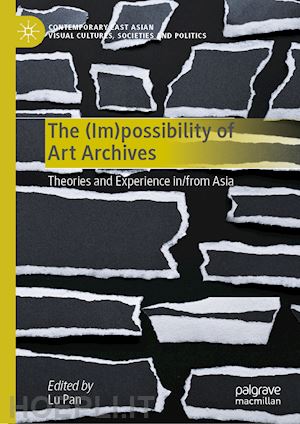
Questo prodotto usufruisce delle SPEDIZIONI GRATIS
selezionando l'opzione Corriere Veloce in fase di ordine.
Pagabile anche con Carta della cultura giovani e del merito, 18App Bonus Cultura e Carta del Docente
This edited volume aims to fill the gap in the research, juxtaposition, and focused discussions in the existing literature on art archives in Asia. Most of the archives included in the book are independent and initiated by individuals, folk groups, or non-profit organizations. In this book, one can trace the dynamics and self-generative capacity in this particular historical and cultural milieu through these “alternative” archives and through the practices of artists and curators who apply their specific understanding of archive to their works. Many chapters resonate with each other in that they capture the experiences shared by many places in Asia. Those experiences could have resulted from the encounter with the Western idea of archive, the influence of the colonial experience, or a memory crisis triggered by the rapid transformation of media, and may serve as a basis for producing archive theories in/from Asia. The book provides an opportunity for the archives in Asia and those who work around them to recognize one another, understand what their colleagues in archival work do, how they do it and what else there is for them to do.
Part I: Accumulation and Creation: The Birth of Archive.- Chapter 1: Diverse Voices of Japanese Modern and Contemporary Art: The Oral History Archives of Japanese Art.- Chapter 2: “Accumulation” and “Reward”: An Interview with Chen Tong on Video Bureau.- Chapter 3: RE-VISIONING THE ARCHIVES: On the Creation and Curation of a Relational and Decolonial Visual Art Archives in Asia.- Chapter 4: Hijikata Tatsumi Archive: A Pioneering Dance Archive in Japan.- Chapter 5: One-Man Archive: Koh Nguang How on the Possibilities of Archiving Singapore Art.- Part II: Deconstruction and Recreation: Artist, Curator and Research on Archive.- Chapter 6: Encountering Incompleteness: Archives, Institutions and Exhibition-making.- Chapter 7: The Need of Art Archives in India.- Chapter 8: The Timeless Plunge: The Ha Bik Chuen Archive.- Chapter 9: Endless Documents: Chinese Contemporary Art and Curatorial Practices in Archives.- Chapter 10: The Eyes of Archives: How Contemporary Taiwanese Video Art Set off a Revolt Regarding Japanese Colonial History.- Chapter 11: Expose: Archive of.- Matsuzawa Yutaka.- Chapter 12: It Takes a Village: Archives Talk Back.- Chapter 13: Others, A Night in Tokyo, Coconut Forest and Tigers: Observations of a Pseudo-Tourist.- Chapter 14: Muse.- the archive, archival/exhibiting turn.- Chapter 15: The Retrieval, Restoration, and Predicament Objects, Memories and Records in Wartime.- Chapter 16: Toward Archiveology: Regarding Nguyen Trinh Thi’s Essay Films.- Part III: The Public and Imagination: Archive as Self-Portrait of Community.- Chapter 17: The Relationship between Sendai Mediatheque’s Art Exhibitions and 3.11 Archives - A case study of “Record and Recalling: Walking on the House of Images”.- Chapter 18: Rescuing an image of one’s own: Memoirs of a Taiwanese folk image preservation movement.- Chapter 19: Archives Without Archivists: Notes on “I’m calling you. rebirth of humans and the elephant.- Chapter 20: Multitude Asia: Huang Sun-quan on Articulation, Network, Asian Visual Archive.- Chapter 21: Praxis of Praxis: Collaborative Art Archiving, Going beyond an Imagined Community toward a Community in Process.- Chapter 22: Archiving the Commons: Struggle of anti-gentrification and anti-eviction.
Lu Pan is Associate Professor at Department of Chinese History and Culture, The Hong Kong Polytechnic University.











Il sito utilizza cookie ed altri strumenti di tracciamento che raccolgono informazioni dal dispositivo dell’utente. Oltre ai cookie tecnici ed analitici aggregati, strettamente necessari per il funzionamento di questo sito web, previo consenso dell’utente possono essere installati cookie di profilazione e marketing e cookie dei social media. Cliccando su “Accetto tutti i cookie” saranno attivate tutte le categorie di cookie. Per accettare solo deterninate categorie di cookie, cliccare invece su “Impostazioni cookie”. Chiudendo il banner o continuando a navigare saranno installati solo cookie tecnici. Per maggiori dettagli, consultare la Cookie Policy.